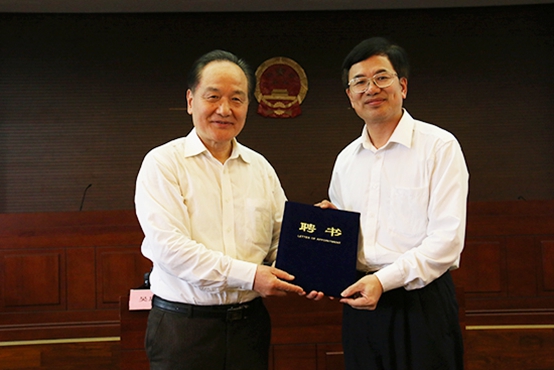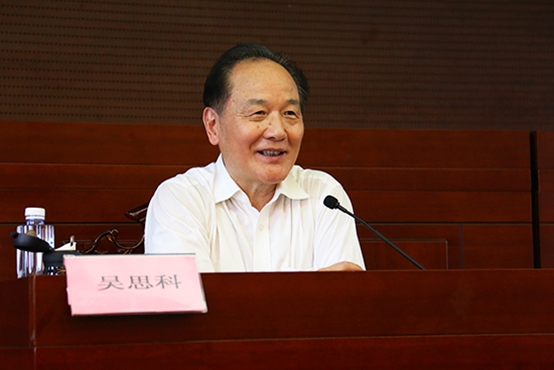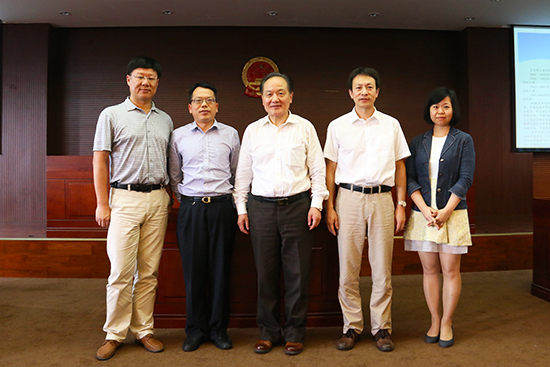On the morning of April 20th, WU Sike, a renowned Chinese senior diplomat visited GDUFS and gave a lecture on the Culture and Diplomacy: Reflections on the Construction of “the Belt and Road Initiatives”as the first of a series of lectures in GDUFS’s Forum on Social Studies for greeting the 50th anniversary of our university. This lecture was held by School of Legal Studies and jointly sponsored by the Publicity Department of Party Committee and the Guangdong Research Institute for International Strategies.
After the symposium, SUI Guangjun, Secretary of the Party Committee of GDUFS had a brief talk with WU, during which SUI introduced our school’s history, majors of minor languages and the construction of a Think-Tank especially designed for the special responsibility and mission that our school undertake, in the research of “the Belt and Road Initiatives”, and for the expressed expectation that WU’s instruction be clearly understood. Hearing that, WU appreciated our school’s specialty and achievements very much and was willing to help the construction of Think-Tank, Dr. SUI wanted to support the idea.
Before the lecture, Vice-President HE Chuantian awarded WU a certificate of “Emeritus Professor” of the Guangdong Research Institute for International Strategies. People who attended this lecture were HU Wentao, Minister of the Publicity Department of the Party Committee and CHEN Hanxi, Deputy Secretary General of the Guangdong Research Institute for International Strategies. The lecture was presided over by WANG Shuchun, Associate Dean of the School of Legal Studies.

Awarding the letter of appointment
WU elucidated the importance of culture in diplomatic practice through illustrating that culture could enhance trust, promote communication and help to judge situations. Based on the reactions and suggestions from the international community, he explained the opportunities and challenges China faced in advancing “the Belt and Road Initiatives”, emphasizing that we should push forward this strategy through cultural exchange.

WU Sike communicates with the audience
Culture: the “binder” for enhancing trust
Through reviewing the tortuous course that the Chinese delegation attending the Bandung Conference in 1955, WU revealed the importance of cultural exchanges in enhancing the mutual-trust among countries. During the conference, through interpreting the traditional Chinese culture of “Harmony”, China proposed the guideline of “seeking common points while reserving differences”, influencing those participants from Asia and Africa and establishing the spirit of the Bandung Conference as one of seeking solidarity and cooperation, seeking common points while reserving differences and achieving consensus among Asians and Africans.
Culture: the emotional bond for communication by heart
When talking about how different cultures could influence the diplomatic practice through communication by heart, WU cited the viewpoints of FEI Xiaotong, a renowned socialist, as “Every form of beauty has its uniqueness, precious is to appreciate other forms of beauty with openness. If beauty represents itself with diversity and integrity, the world will be blessed with harmony and unity.” Again through retrospecting his several years of diplomatic work experience in the Middle Eastern countries, WU emphasized the importance of cultural exchange to mutual-trust among countries.
Culture: a vital navigation mark for judging situations
With the example that the US launched the war in Iraq in 2003, WU told us that the war became passive as. at last, the reason lies in that the White House had overlooked the traditional culture and historical development of the Mid East before launching the war, thus concluding that culture is a vital navigation mark for judging situations.
“The Belt and Road Initiatives”: both an opportunity and challenge for China
WU gave a brief introduction to the history and background, the goal and significance of “the Belt and Road Initiatives”, considering that the Mid East countries are positive to this strategy. However, there existssome adverse factors such as interference of great powers during the implementation of the strategy. For this reason, China needs to take advantage of cultural exchanges to push forward the smooth execution of the strategy.
Message to GDUFS: give full play to the Think-Tank in major national external strategies
WU said, “The Belt and Road Initiatives” is a major national strategy and an important “public product” that China provided for the international community. He hopes our school could persist in internationalization, take initiative to cultivate more talents and take advantage of the Think-Tank, making more contributions to realize the “China Dream”.

Group photo

